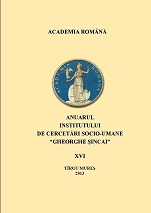De la comic la degrada(n)t. Opţiuni discursive în evaluarea straiului ţiganilor transilvăneni în scrierile saşilor în lungul secol al XIX-lea
Amusing or degrade(-ing)-d. Discursive choices in assessing the Transylvanian Gypsies’ attire in the long 19th century Transylvanian Saxons’ writings
Author(s): Marian ZăloagăSubject(s): Social Sciences
Published by: Institutul de Cercetări Socio-Umane Gheorghe Şincai al Academiei Române
Keywords: attire; Transylvanian Saxons; generic Gypsy; poverty; hegemonic discourses; marginal cultures
Summary/Abstract: Except from the skin color, one of the most at hand indicator in signaling social and cultural belonging was the attire. It has always been regarded as a distinctive mark in evidencing the difference between individuals as well as between certain groups. Inability to cope with some requirements could, eventually, generate pitiful or, on the contrary, drastic moralizing discourses. In traditional societies, it even predispose to exclusion or labeling as deviant of those who could not comply with the rules. In my study, I explore the discourses promoted in German language press and ethnographical literature from Transylvania with regard of the sartorial representation of a marginal group such as that represented by the Gypsies. I intend to show that their attires’ representation was described in a more or less „realist” manner or, on the contrary, caricatured, in an attempt to actually ridicule them or/and reinforce a set of moralizing discursive attitudes from the part of knowledge producers that has been for the time being, without exception, external to the group. Descriptions made absolute abstraction of the objective criteria which made the Gypsies unable to comply with a set of quality, hygienic and decency norms apriorically taken as universal standards by the European and provincial normative groups. They were more likely to portray a culture of poverty that was totally deficient in providing for themselves with those items assigned under the category of the most basic needs. This point only strengthened the location of this marginal culture on the terrain of moral and social anomie. Thus, it became one, among many arguments, that legitimized centuries - old hierarchies and formal exclusion.
Journal: Anuarul Institutului de Cercetări Socio-Umane »Gheorghe Şincai« al Academiei Române
- Issue Year: 2013
- Issue No: 16
- Page Range: 20-42
- Page Count: 23
- Language: Romanian

